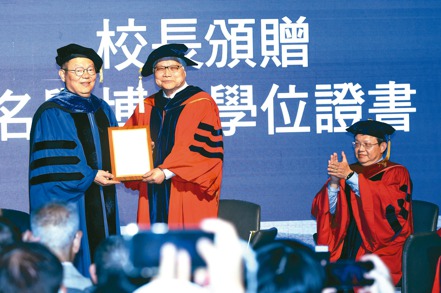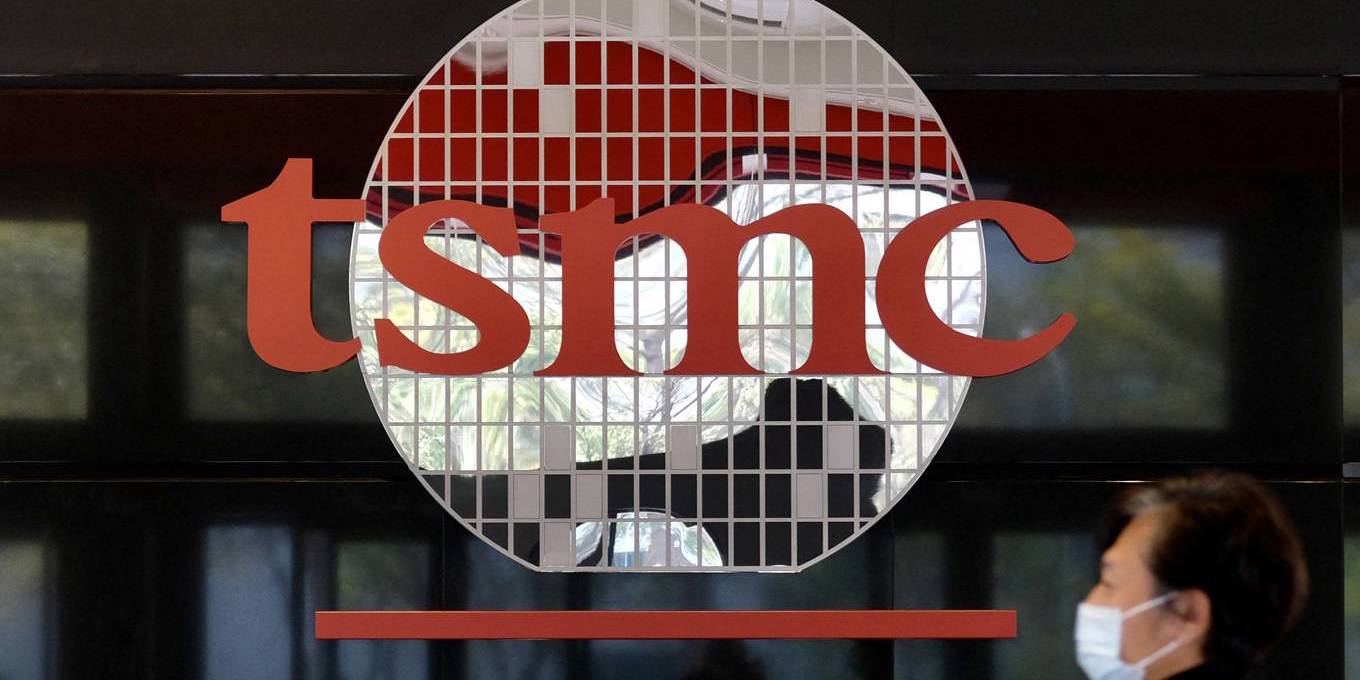Emphasizing customer trust is the key to success

TSMC President Wei Zhejia (right) was awarded an "Honorary Doctorate" by President Lin Qihong of National Yang-Ming Chiao Tung University. Reporter Pan Junhong/Photography
Economic Daily reporter Zhong Huiling/Reporting from Taipei
TSMC President Wei Zhejia pointed out that TSMC does not compete with customers and win their trust. Perhaps opponents will catch up with the process and technology, but TSMC’s pure wafer foundry model gaining the trust of customers is the key to victory. It is located in South Korea Competitors in California all have products. If they want to compete with TSMC, there is simply no way.
The outside world believes that the opponents hinted by Wei Zhejia are Samsung and Intel.
Yang-Ming Jiaotong University yesterday awarded Wei Zhejia a dual degree of honorary doctorate in engineering and honorary doctorate in science. TSMC founder Zhang Zhongmou and Hon Hai chairman Liu Yangwei were both present to congratulate him. Wei Zhejia said humorously that he felt indescribably happy to get his degree without having to pass the exam this time.
In his speech, Wei Zhejia said that TSMC founder Zhang Zhongmou pioneered the pure wafer foundry model, which allowed many IC product companies to spring up. Under Zhang Zhongmou’s active leadership, TSMC gradually reached the number one position in the world.
Wei Zhejia emphasized that "customer trust" is very important. In terms of technology and manufacturing, opponents may one day catch up with TSMC or be as good as TSMC, although he thinks it is unlikely. However, customer trust is the key to victory, and both powerful opponents have it. If you want to compete with TSMC with your own products, simply put, there is "no way". Wei Zhejia said that TSMC’s values are integrity, commitment, innovation, and customer trust. TSMC will spare no effort to enable customers to succeed in the market.
Citing the work of management expert Jim Collins, Wei Zhejia pointed out that a good company will fail. The first step is for the CEO to "forget who I am", unable to listen to other people's opinions, and start to expand crazily regardless of whether there is enough money, so he told You must "never forget who I am" and "know who I am".
Looking back on those years, Wei Zhejia said that in fact, his first choice was to be a doctor, but he was afraid to see blood. "People need to know what they can do and what they cannot do." His second choice was to evaluate buildings, but he felt that he had no talent. I had no choice but to choose to read the motor. Through self-observation, Wei Zhejia found out where his talents lie, and eventually obtained a PhD in electrical engineering from Yale University in the United States. "When I was studying for a PhD, I knew that my brain was not that strong, but I liked engineering very much, so I went to the industry." Wei Zhejia pointed out that 40 years ago, he did not know that semiconductors would be so important. "I happened to be in this industry and was seen by Morris (Zhang Zhongmou) at the right moment. I was very lucky."
Wei Zhejia said that he learned to listen from Zhang Zhongmou, but so far he has not been able to obtain 100% true information. When Zhang Zhongmou chatted with him, he never interrupted him, but he occasionally interrupted when Zhang Zhongmou was talking.

 money.udn.com
money.udn.com

TSMC President Wei Zhejia (right) was awarded an "Honorary Doctorate" by President Lin Qihong of National Yang-Ming Chiao Tung University. Reporter Pan Junhong/Photography
Economic Daily reporter Zhong Huiling/Reporting from Taipei
TSMC President Wei Zhejia pointed out that TSMC does not compete with customers and win their trust. Perhaps opponents will catch up with the process and technology, but TSMC’s pure wafer foundry model gaining the trust of customers is the key to victory. It is located in South Korea Competitors in California all have products. If they want to compete with TSMC, there is simply no way.
The outside world believes that the opponents hinted by Wei Zhejia are Samsung and Intel.
Yang-Ming Jiaotong University yesterday awarded Wei Zhejia a dual degree of honorary doctorate in engineering and honorary doctorate in science. TSMC founder Zhang Zhongmou and Hon Hai chairman Liu Yangwei were both present to congratulate him. Wei Zhejia said humorously that he felt indescribably happy to get his degree without having to pass the exam this time.
In his speech, Wei Zhejia said that TSMC founder Zhang Zhongmou pioneered the pure wafer foundry model, which allowed many IC product companies to spring up. Under Zhang Zhongmou’s active leadership, TSMC gradually reached the number one position in the world.
Wei Zhejia emphasized that "customer trust" is very important. In terms of technology and manufacturing, opponents may one day catch up with TSMC or be as good as TSMC, although he thinks it is unlikely. However, customer trust is the key to victory, and both powerful opponents have it. If you want to compete with TSMC with your own products, simply put, there is "no way". Wei Zhejia said that TSMC’s values are integrity, commitment, innovation, and customer trust. TSMC will spare no effort to enable customers to succeed in the market.
Citing the work of management expert Jim Collins, Wei Zhejia pointed out that a good company will fail. The first step is for the CEO to "forget who I am", unable to listen to other people's opinions, and start to expand crazily regardless of whether there is enough money, so he told You must "never forget who I am" and "know who I am".
Looking back on those years, Wei Zhejia said that in fact, his first choice was to be a doctor, but he was afraid to see blood. "People need to know what they can do and what they cannot do." His second choice was to evaluate buildings, but he felt that he had no talent. I had no choice but to choose to read the motor. Through self-observation, Wei Zhejia found out where his talents lie, and eventually obtained a PhD in electrical engineering from Yale University in the United States. "When I was studying for a PhD, I knew that my brain was not that strong, but I liked engineering very much, so I went to the industry." Wei Zhejia pointed out that 40 years ago, he did not know that semiconductors would be so important. "I happened to be in this industry and was seen by Morris (Zhang Zhongmou) at the right moment. I was very lucky."
Wei Zhejia said that he learned to listen from Zhang Zhongmou, but so far he has not been able to obtain 100% true information. When Zhang Zhongmou chatted with him, he never interrupted him, but he occasionally interrupted when Zhang Zhongmou was talking.

總裁展現信心 魏哲家:與台積競爭「門都沒有」 | 產業熱點 | 產業 | 經濟日報
台積電總裁魏哲家昨(29)日指出,台積電不與客戶競爭、贏得客戶信任,或許對手會追上製程與技術,但台積電純晶圓代工模式獲得...


